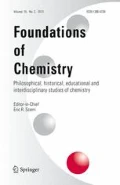Abstract
Research into learners' ideas about science suggests that students often have alternative conceptions about important science concepts. Because of this dissatisfaction, constructivism has been adopted as a theoretical framework by many teachers and researchers, and it has had a curricular influence in many countries. Constructivism is much more than an educational doctrine and we are aware that a ‘science war’ about the possibility of objectivity is in progress. ‘Constructivism’ cannot necessary be a package deal: it must be possible to accept educational suggestions deemed useful without buying all the epistemology or the metaphysical implications. The claim that cognitive agents understand the world by constructing mental representations of it can be a shared suggestion for changing science instruction. Many teachers are much more concerned in finding productive teaching methods than about philosophical questions as if knowledge must be considered an objective representation of the real world or not. We have to ponder if some ideas from the constructivist theory of instruction can help instructors to become better teachers. The pragmatic suggestions that come from the constructivist theory of instruction developed by von Glasersfeld, the leading proponent of radical constructivism, could be a good start in this␣search.
Similar content being viewed by others
References
Bodner G.M., Klobuchar M., Geelan D. (2001) The Many Forms of Constructivism. Journal of Chemical Education 78:1107
Foundations of Science 6(1–3): 1–237; (4): 239–398, 2001
Good R. (1993) The many forms of Constructivism. Journal of Research in Science Teaching 30 (9):1015
Hawkes S.J. (1996) Buffer Calculations Deceive and Obscure. The Chemical Educator 6:S1430–4171
M. Niaz, F.F. Abd-El-Khalick, A. Benarroch, L. Cardellini, C.E. Laburú, N. Marín, L.A. Montes, R. Nola, Y. Orlik, L.C. Scharmann, C.-C. Tsai and G. Tsaparlis. Constructivism: Defense or a Continual Critical Appraisal. A Response to Gil-Pérez et al., Science & Education 12: 787–797, 2003
E. von Glasersfeld. An Introduction to Radical Constructivism. In P.␣Watzlawick (Ed.), The Invented Reality. How Do We Know What We Believe We Know? Contributions to Constructivism, pp. 17–40. New York: Norton & Co. Inc., 1984
von Glasersfeld E. (1987) Construction of Knowledge. Salinas, CA: Intersystems Publications
von Glasersfeld E. (1989) Cognition, construction of knowledge, and teaching. Synthese 80:121–140
E. von Glasersfeld. Environment and Communication. In L.P. Steffe and T.␣Wood (Eds.), Trasforming Children’s Mathematics Education: International Perspectives, pp. 30–38. Hillsdale, NJ: Erlbaum, 1990. As reported in: M.R. Matthews, Science Teaching. The Role of History and Philosophy of Science, p. 148. New York: Routledge, 1994
von Glasersfeld E. (1992) Questions and Answers about Radical Constructivism. In Pearsall MK (Ed). Scope, Sequence and Coordination of Secondary School Science. Volume II. Relevant Research, Washington, DC: The National Science Teachers Association, pp. 169–182
von Glasersfeld E. (1995) A Constructivist Approach to Teaching. In Steffe L.P. Gale J. (Eds). Constructivism in Education. Hillsdale, NJ: Erlbaum, pp. 3–15
von Glasersfeld E. (1995) Sensory Experience, Abstraction, and Teaching. In Steffe L.P., Gale J. (Eds). Constructivism in Education. Hillsdale, NJ: Erlbaum, pp. 369–383
E. von Glasersfeld. Knowing without Metaphysics: Aspects of the Radical Constructivist Position. In F. Steier (Ed.), Research and Reflexivity (Inquiries into Social Construction), pp. 12–29. London: Sage Publications, 1991. Online at http://www.mcgill.ca/douglas/fdg/kjf/17-TAGLA.htm
von Glasersfeld E. (2001) The radical constructivist view of science. Foundations of Science 6:31–43
Riegler A. (2001) Toward a radical constructivist understanding of science. Foundations of Science 6:1–30
Scerri E.R. (2003) Philosophical Confusion in Chemical Education Research. Journal of Chemical Education 80:468–477
Author information
Authors and Affiliations
Corresponding author
Rights and permissions
About this article
Cite this article
Cardellini, L. The Views and Influence of Ernst Von Glasersfeld: An Introduction. Found Chem 10, 129–134 (2008). https://doi.org/10.1007/s10698-006-9022-x
Received:
Accepted:
Published:
Issue Date:
DOI: https://doi.org/10.1007/s10698-006-9022-x


